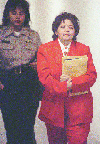
Monday, January 08, 2007
Tuesday, January 02, 2007
who produced the information must preserve it
The 2006 Discovery Amendments to the Federal Rules of Civil Procedure
E-mail This Article. E-mail This Article
Printer Print This Article
by Carl G. Roberts
August 2006
Proposed amendments to the Federal Rules of Civil Procedure were approved by the Supreme Court on April 12, 2006 and, barring the unlikely event of an intervention by Congress, will become effective on December 1, 2006. The amendments introduce a new category of discoverable information – electronically stored information, sometimes referred to by the acronym "ESI."
The amendments also provide subtle support for several trends in the management of discovery that have been developing over at least the last decade, including greater involvement by courts in the planning and oversight of routine discovery processes and additional early disclosure and discussion requirements among counsel.
The amendments provide some shelter from the storm for parties fearful of sanctions for truly inadvertent spoliation, and they also provide a limited margin of safety against inadvertent waivers of privilege.
Much of the impact of the amendments will not be realized until courts begin to issue opinions. One thing is certain, however – the amendments do not, in any way, shape, or form, return parties and counsel to the halcyon days of pre-computer era discovery.
Rule 34
Electronically stored information [Amended Rule 34(a)]
The starting point for the changes in the discovery rules is Rule 34. When it was originally adopted, Rule 34(a) covered discovery of "documents" and "things." The term "data compilations" was added with the 1970 amendments, in anticipation of increased use of computerized information. However, developments in computer technology have led to forms of information that defy easy characterization as documents or data compilations. Courts, counsel and parties so far have closed any gaps on an ad hoc basis, typically by expansive custom definitions or references to the "intended" scope of the discovery rules. The Rules Committee believed that such impromptu approaches were not sufficient for the long term. The introduction of the category of "electronically stored information" should permit the discovery rules to keep pace with developments in information technology for many years into the future. Parenthetically, the term "data compilations" is being dropped, as all forms of information are believed to be subsumed within either documents or electronically stored information.
The newly introduced category of electronically stored information does not require that we discard all of our document request templates. The Committee Note observes that "a Rule 34 request for production of ‘documents' should be understood to encompass, and the response should include, electronically stored information unless discovery in the action has clearly distinguished between electronically stored information and ‘documents.'" In effect, simpler is better, or at least goes farther.
Test or sample [Amended Rule 34(a)]
Under amended Rule 34(a), a reviewing party has the right to "test or sample" electronically stored information. The Committee Note observes that the right to do so had not been clear in the current version of the rule. The complexity of electronic information systems can be challenging for a party seeking specific kinds of information from an adversary. Alternative approaches to address this complexity have included very broad requests, multiple rounds of discovery and depositions under Rule 30(b)(6). All of these strategies increase the cost and time expended on discovery. The explicit option to test or sample as part of the initial production process should help counsel devise ways to obtain complete responses to pertinent requests more quickly and economically.
Form of production [Amended Rule 34(b)]
The same information can be stored in different forms. Examples are a letter stored as a paper printout, as a word processing file, or as a scanned image; an e-mail message printed to paper, exported to various computer-readable file formats, or imaged in TIFF or PDF formats; sounds stored in analog or digital form suitable for audiotape, in digital form suitable for CD-ROM players, as WAV files to be played on a computer, or as MP3 files for an iPod®; and database information in the database program tables, in a comma-delimited text file for export, in a paper report, in a TIFF or PDF image, or displayed in an on-screen report.
Amended Rule 34(b) permits a requesting party to specify the form for producing electronically stored information. If the responding party objects or if no form was specified, the responding party must state the form or form it intends to use. The default forms are those (1) "in which [the electronically stored information] is ordinarily maintained" or (2) "that are reasonably usable."
The utility to a requesting party of the different forms in which a particular item of electronically stored information can be produced may vary. For example, when an email message in Microsoft's Outlook program is produced as a paper printout, it will not display the background information and linkages to other messages that would appear if it were produced in the original .PST computer file format. An intermediate format such as TIFF (Tagged Image File Format) may include some or all of the additional information, depending on how it was generated, what the source information was and what the requesting party is looking for. An excellent discussion of these issues and their implications for discovery is found in the opinion of Magistrate Judge David Waxse in Williams v. Sprint/United Management Company, 230 F.R.D. 640 (D. Kan. 2005).
It would be easy for a requesting party to subject a producing party to extra work with demands for multiple forms of the same discovery information. Amended Rule 34(b) provides a counter to this by stating that "a party need not produce the same electronically stored information in more than one form." The court retains its general power under the discovery rules to override this provision in appropriate circumstances.
Rule 33
Production as answer [Amended Rule 33(d)]
Current Rule 33(d) gives a responding party the right to produce business records in answer to an interrogatory if the burden of deriving the answer will be substantially the same for both parties. Amended Rule 33(d) extends this right to the newly introduced category of electronically stored information.
The option to produce electronically stored information will be a boon in some situations. However, the Committee Note points out that a party that chooses to respond to a Rule 33 interrogatory by producing electronically stored information may find itself obligated to provide technical support and even direct access to its electronic information system. This is because the rule obligates the producing party to provide "sufficient detail to permit the interrogating party to locate and to identify, as readily as can the party served, the records from which the answer may be ascertained," and further requires that the party serving the interrogatory be afforded "reasonable opportunity to examine, audit or inspect" the records that are identified. This degree of disclosure can raise concerns when sensitive confidentiality and privacy interests are involved. The Committee Note concludes that the burdens associated with producing electronically stored information in such cases may lead a responding party to "derive or ascertain and provide the answer itself" rather than invoke Rule 33(d).
Rule 26
Initial disclosures [Amended Rule 26(a)(1)(B)]
Current Rule 26(a)(1)(B) requires each party to disclose during the opening stages of a case a copy or a description by category and location of all documents and things in the disclosing party's possession, custody or control that it may use affirmatively to support its claims or defenses. The new category of electronically stored information is added to the list by the amendment to Rule 26(a)(1)(B).
Production issues and accessibility [Amended Rule 26(b)(2)(B)]
It may be easier and less expensive in many circumstances to produce discovery information in an electronic form than to do so in traditional, hard-copy formats. However, a wide variety of issues can plague a party attempting to collect, review and produce responsive electronically stored information. The information might be difficult or impossible to locate, stored in obsolete and unreadable file formats, stored in forms that require significant expenditures of time or money to render usable and comprehensible, so evanescent that it cannot be captured without alteration or at all, incredibly voluminous, or so riddled with highly sensitive confidential or privileged content that a privilege review becomes more expensive than the sums at issue in the litigation. Some of these issues challenge a party's ability to manage the discovery process after it has determined that a source contains relevant electronically stored information. But others affect a party's threshold ability to ascertain whether a source contains any discoverable information. Rule 26(b)(2)(B) addresses the latter difficulty by providing that electronically stored information need not be provided if the source is not reasonably accessible on account of either undue burden or undue cost.
The party seeking the discovery need not accept the objection of the party from whom the discovery is requested, and may move to compel the discovery in question. In the motion practice that follows, the burden is on the party from whom the discovery is sought to demonstrate "undue burden or cost."
The amended rule does not specify the test for whether the burden has been sustained. The public discussion preceding adoption of the amendment indicates that simple explanations such as "inactive" or "backup" will not suffice. Many enterprises routinely use their backup tapes as an archive and can readily spool up and restore a tape to search for and retrieve particular files. What the tests may be and how they evolve with changing technology will be closely watched as courts start to apply the amended rule.
The amended rule permits a court to compel production even if the party from whom the information is sought has sustained its burden, if the party requesting the information can show good cause. This inquiry invokes the balancing provisions of Rule 26(b)(2)(C). The Committee Note suggests several factors that may be considered by a court seeking to balance the costs and benefits of discovery of electronically stored information. These include: (1) the specificity of the discovery request, (2) the quantity of information available from other and more easily accessed sources, (3) the failure to produce relevant information that seems likely to have existed but is no longer available on more easily accessed sources, (4) the likelihood of finding relevant, responsive information that cannot be obtained from other, more easily accessed sources, (5) predictions as to the importance and usefulness of the further information, (6) the importance of the issues at stake in the litigation, and (7) the parties' resources. Rule 26(b)(2)(C) further permits a court to alter the balance by, for example, setting limits on the permitted scope of discovery or shifting some of the production costs to the requesting party.
The foregoing inquiry is not a new one. Readers familiar with the current landscape of e-discovery decisions will recognize similarities to – and some differences from – the balancing tests that have been developed and applied in recent years by courts confronted with production and cost-shifting cases. A well-known example is the seven-factor test developed by Judge Scheindlin in her first Zubulake opinion ( Zubulake v. UBS Warburg, LLC, 217 F.R.D. 309, 324 (S.D.N.Y. May 13, 2003)), which takes into account, but does not weight equally: (1) the extent to which the request is specifically tailored to discover relevant information, (2) the availability of such information from other sources, (3) the total cost of production, compared to the amount in controversy, (4) the total cost of production, compared to the resources available to each party, (5) the relative ability of each party to control costs and its incentive to do so, (6) the importance of the issues at stake in the litigation, and (7) the relative benefits to the parties of obtaining the information.
It is important to recognize that amended Rule 26(b)(2)(B) only relieves a party from having to produce electronically stored information from sources that are not reasonably accessible. It does not in any way address the party's responsibility to preserve relevant information on those sources during the pendency of the litigation.
Privileged and trial-preparation information [Amended Rule 26(b)(5)(B)]
One of the most difficult problems associated with discovery of electronically stored information is that of privileged or confidential content. Electronically stored information is frequently voluminous. It also characteristically includes metadata (which shows the history and context of the information) and links to other information. These additional layers are generally invisible or lost with hard-copy production, and often are not readily visible even to someone viewing the display from the application program that created the information. They are visible, however, to an appropriately armed investigator, and the information content can be extremely valuable or devastating, depending on the perspective of the party.
With privileged information in particular, the consequences of disclosure can shift the case dynamics radically. As Magistrate Judge Grimm observed in Hopson v. Mayor and City Council of Baltimore, 232 F.R.D. 228 (D. Md. 2005), the consequences may vary dramatically with the jurisdiction. He identified three dominant schools of thought: (1) "strict accountability", which almost always finds waiver, even if production is inadvertent, because "once confidentiality is lost, it can never be restored", (2) the "lenient/ "to err is human" approach, which views waiver as requiring intentional and knowing relinquishment of the privilege and finds waiver in circumstances of inadvertent disclosure only if caused by gross negligence, and (3) a "balancing test" approach that requires the court to make a case-by-case determination of whether the conduct is excusable so that it does not entail a necessary waiver. 232 F.R.D. at 235-36. Moreover, the scope of a waiver can vary from the contents of the particular information disclosed, through the information necessarily related to it, to all information encompassed within the subject matter of the disclosed information. 232 F.R.D. at 237.
Amended Rule 26(b)(5)(B) does not even attempt to resolve the scope of waiver question. It leaves that to local substantive law. But it does create a process and procedure to stop the spread of an initial disclosure – figuratively, a "litigation hold" for privilege waivers – so that the parties and the supervising court have an unimpeded opportunity to address the consequences of the disclosure. It does so by requiring a party that has received allegedly privileged information, upon receipt of a notice of a claim of privilege, to "promptly return, sequester, or destroy the specified information and any copies it has." Moreover, the receiving party "may not use or disclose the information until the claim is resolved." Recognizing that a receiving party's first response to receipt of privileged information may well be to distribute it to other members of the litigation team, the amended rule further requires that the receiving party "must take reasonable steps to retrieve" the information.
The receiving party may bring the issue to the court's attention for determination. The producing party must preserve the information until the claim of non-waiver is resolved.
Conference of parties to plan discovery [Amended Rule 26(f)]
Current Rule 26(f) requires the parties to confer as soon as practicable, and in any event before the first scheduling conference, regarding the nature and basis of their claims and defenses, the possibilities for settlement and a discovery plan. Amended Rule 26(f) adds several items to counsel's agenda for their planning conference. These include (1) preservation of discoverable information, (2) any issues relating to disclosure or discovery of electronically stored information, including the form or forms in which it should be produced, and (3) any issues regarding claims of privilege or protection as trial-preparation material, including, if the parties agree on a procedure for asserting non-waiver after production of privileged or trial-preparation material, whether to ask the court to include their agreement in an order. As is discussed below, this last subject is particularly important for discovery of electronically stored information.
There are several reasons why counsel should engage in the extra planning needed to take full advantage of this opportunity to discuss the weaknesses and strong points of their clients' records systems. First, courts will expect it. The standing orders and local rules that have already been issued by, e.g., the District of Delaware, the District of New Jersey and the Middle District of Pennsylvania, are explicit in this regard.
Second, an agreement regarding non-waiver of privilege is best reached before any disclosures of privileged information have taken place. If the parties are concerned about the effectiveness of such arrangements as to third parties, early agreement and a decision to request that the court incorporate the agreement in an order is even more important. See, for example, Judge Grimm's decision in Hopson, 232 F.R.D. at 239, where he concluded, among matters, that the only way to ensure that the parties' non-waiver agreement will be effective against third parties is to include it in an order by the court.
Third, the planning conference is probably the best opportunity counsel will have to control the direction and, therefore, the cost and duration of discovery. The Committee Notes suggest that counsel consider various protocols to improve the efficiency and economy of discovery for electronically stored information. A specific example is the "quick peek", where the party from whom discovery is sought provides a sampling of requested materials for initial examination without waiving any privilege or protection, and requesting counsel then designates the particular information to be produced. Another approach might be to partition the discovery into phases, with review and production initially being restricted to designated categories of information that have the highest probable value, and other categories being held back from review until it is determined that more or different information is needed.
What is striking about the amendment to Rule 26(f) is the emphasis placed on collaborative efforts between adversaries. Counsel may have difficulty adjusting to this direction in the rules amendments, but resistance will be at their peril. Local rules and standing orders are even more explicit about this requirement. A particularly strong example is the Electronic Discovery Default Standard by the District of Delaware (available under "Policies and Procedures" at http://www.ded.uscourts.gov/OrdersMain.htm). The Standard begins with the affirmative statement that: "It is expected that parties to a case will cooperatively reach agreement on how to conduct e-discovery." The Standard further requires that each party designate a single individual as its "e-discovery liaison." The e-discovery liaison need not be an attorney, but must be familiar with the party's systems and capabilities, be able to explain and answer relevant questions about the systems, be knowledgeable about the technical aspects of e-discovery, and be prepared to participate in e-discovery dispute resolutions.
Rule 16
Scheduling order [Amended Rule 16(b)]
Current Rule 16(b) requires the court to enter a scheduling order at an early stage of the case, after receiving counsel's report under Rule 26(f) or consulting with counsel. The scheduling order should, among matters, limit the time to complete discovery. The scheduling order may also include other matters pertinent to the administration of the case.
The amendment to Rule 16(b) adds "provisions for disclosure or discovery of electronically stored information" and "any agreements the parties reach for asserting claims of privilege or protection as trial preparation materials after production" to the matters that the court may include in the scheduling order. This language confirms the importance of counsel's early identification and discussion in the Rule 26(f) conference of possible issues and concerns relating to discovery of electronically stored information.
Rule 37
Safe harbor [Amended Rule 37(f)]
The amendment to Rule 37 is completely new. Sometimes referred to as the "safe harbor" rule, it provides:
(f) Electronically Stored Information. Absent exceptional circumstances, a court may not impose sanctions under these rules on a party for failing to provide electronically stored information lost as a result of the routine, good-faith operation of an electronic information system.
Counsel and parties should be careful about how much reliance they place on the protection afforded by amended Rule 37(f). It is directed very narrowly to information that has been lost due to the "routine operation of an electronic information system." The Committee Note explains that "routine operation" refers to the way such systems are "generally designed, programmed, and implemented to meet the party's technical and business needs."
Amended Rule 37(f) provides protection only if the operation of the system was in good faith. Many obligations of a party may affect what constitutes good faith. For example, a party has a general obligation to preserve information that is relevant to current or reasonably anticipated litigation. A party may have specific preservation obligations under common law, statutes, regulations and court orders. These obligations may well require a party to make reasonable efforts to stop an electronic information system from overwriting specific stored information. Whether a party has done so is a case-specific inquiry.
The amendment to Rule 37 also applies only to sanctions "under these rules." Sanctions under other rules, statues and regulations, such as the SEC regulations regarding preservation of broker-customer communications, are not affected by the amendment.
Notwithstanding its limitations, amended Rule 37(f) is significant because of the principle it sets forth, in the substantive text of the procedural rules and therefore with the explicit blessing of the Supreme Court, that destruction of discoverable and relevant electronically stored material is to be expected and tolerated in appropriate circumstances. Alternatively stated, strict liability is not the rule.
Rule 45
Subpoena practice
Amended Rule 45 on subpoenas recaps the changes to the other discovery rules in microcosm. Thus:
electronically stored information is added as a category of information that may be sought by subpoena [Amended Rule 45(a)(1)(C)];
testing or sampling may be requested [Amended Rule 45(a)(1)];
the subpoena may specify the form or forms in which electronically stored information is to be produced [Amended Rule 45(a)(1)];
the default form of production for electronically stored information is "a form or forms in which the person ordinarily maintains it or in a form or forms that are reasonably usable" [Amended Rule 45(d)(1)(B)];
the same electronically stored information need only be produced in one form [Amended Rule 45(d)(1)(C)];
electronically stored information from sources identified as not reasonably accessible because of undue burden or cost need not be produced [Amended Rule 45(d)(1)(D)];
the burden to show undue burden or cost is on the party from whom discovery is sought [Amended Rule 45(d)(1)(D)];
if the burden of showing undue burden or cost is met, the court may nonetheless order discovery from such sources if the requesting party shows good cause, considering the limitations of Rule 26(b)(2)(C), and the court may specify the conditions upon which such discovery shall proceed [Amended Rule 45(d)(1)(D)];
a claim of privilege or protection as trial-preparation material may be made after production of discovery material by notice to the receiving party, and the receiving party must then promptly return, sequester, or destroy the specified information and any copies, may not use or disclose the information until the claim is resolved, and, if the information has been disclosed before receiving notice, must take reasonable steps to retrieve the information [Amended Rule 45(d)(2)(B)];
the receiving party may promptly present the privilege or trial-preparation protection issue for determination [Amended Rule 45(d)(2)(B)]; and
the person who produced the information must preserve it until the claim is resolved [Amended Rule 45(d)(2)(B)].
Conclusion
Taken as a whole, the amended discovery rules provide courts, counsel and parties with a great deal of flexibility as they take on the challenges presented by advances in computer technology.
The Secretary of State cleared her to run.
I think these guys are going to learn a lesson or two....
from the attorney general down. The Secretary of State cleared Ms Garcia to run. If you read the AG opinion you will know what a crook this guy is when it comes to the little people. Carlos Valdez, I cant see how he would obtain Jurisdiction given there is no criminal act. This matter should be processed through existing administrative law.
A Voter Registration in Kleberg While Residing in Nueces?
I cannot imagine Carlos Valdez even having anything to do with this case, given his history with Mike Westergren and I am told with Joe Alaniz as well.
If Carlos Valdez prosecutes this lady, he is a fool.
I stand behind her.
















